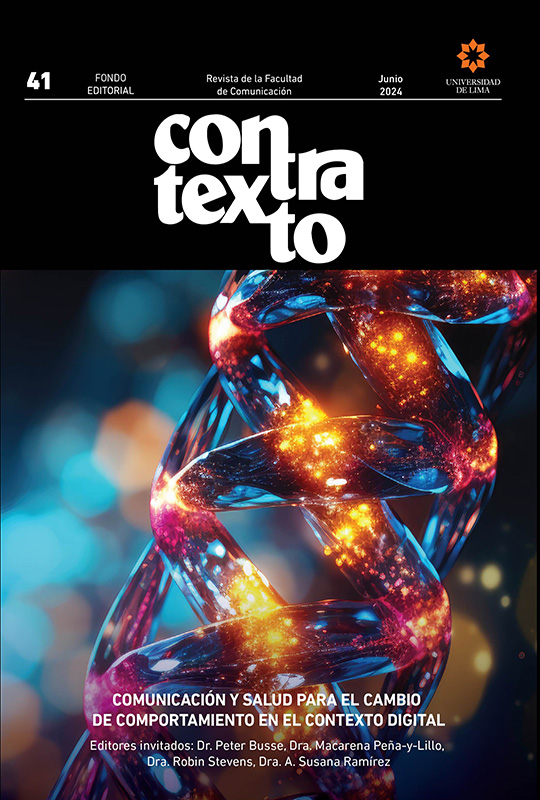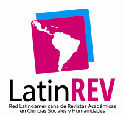Domesticación mutua
DOI:
https://doi.org/10.26439/contratexto2024.n41.7088Palabras clave:
agencia, algoritmos, ciclidad, cultura, domesticación mutua, fluidez, fricciónResumen
Este tráiler desarrolla la noción de domesticación mutua entre personas y algoritmos como clave analítica para entender las culturas algorítmicas. Se argumenta que esta idea ofrece oportunidades para repensar la relación entre personas y tecnologías en la era de los algoritmos y la inteligencia artificial. Se destaca la importancia de conceptualizar la capacidad de acción (agencia) como un proceso cíclico, fluido y lleno de fricciones. Este tráiler sugiere que la perspectiva de la domesticación mutua abre nuevas vías de investigación, especialmente en relación con el tiempo y con dinámicas poco estudiadas en contextos latinoamericanos. Así, con esta noción se busca contribuir a una comprensión más profunda de las realidades específicas del sur global en la experiencia de los medios digitales.
Descargas
Referencias
Cohn, J. (2019). The burden of choice: Recommendations, subversion and algorithmic culture. Rutgers University Press. https://doi.org/10.36019/9780813597850
De Freitas Carrijo, A. J., & Escosteguy, A. C. D. (2024). Algoritmos e cultura digital: Interlocuções com a pesquisa latino-americana. Revista FAMECOS, 31, 1-15. https://doi.org/10.15448/1980-3729.2024.1.44941
Gómez-Cruz, E., Siles, I., Soriano, C. R., & Horst, H. (2023). Beyond the tropicalization of concepts: Theorizing digital realities with and from the Global South. Communication, Culture & Critique, 16(4), 217-220. https://doi.org/10.1093/ccc/tcad037
Linstead, A., & Brewis, J. (2004). Beyond boundaries: Towards fluidity in theorizing and practice. Gender, Work and Organization, 11(4), 355-362. https://doi.org/10.1111/j.1468-0432.2004.00237.x
Martín-Barbero, J. (1988). Communication from culture: The crisis of the national and the emergence of the popular. Media, Culture & Society, 10(4), 447-465. https://doi.org/10.1177/016344388010004004
Rincón, O., & Marroquín, A. (2019). Thinking communications from the perspective of mediations: Genealogies and contributions from a Latin American tradition. En A. C. Pertierra y J. F. Salazar (Eds.), Media cultures in Latin America (pp. 22-32). Routledge. https://doi.org/10.4324/9780429425127-2
Scolari, C. A. (2023). Intermedialidad. Contratexto, 40, 13-20. https://doi.org/10.26439/contratexto2023.n40.676
Seaver, N. (2017). Algorithms as culture: Some tactics for the ethnography of algorithmic systems. Big Data & Society, 4(2), 1-12. https://doi.org/10.1177/2053951717738104
Sharma, S. (2014). In the meantime: Temporality and cultural politics. Duke University Press. https://www.dukeupress.edu/in-the-meantime
Siles, I. (2023). Living with algorithms: Agency and user culture in Costa Rica. MIT Press. https://mitpress.mit.edu/9780262545426/living-with-algorithms/
Siles, I., Espinoza-Rojas, J., Naranjo, A. y Tristán, M. F. (2019). The mutual domestication of users and algorithmic recommendations on Netflix. Communication, Culture & Critique, 12(4), 499-518. https://doi.org/10.1093/ccc/tcz025
Siles, I., Gómez-Cruz, E., & Ricaurte, P. (2023a). Fluid agency in relation to algorithms: Tensions, mediations, and transversalities. Convergence, 0(0), 1-16. https://doi.org/10.1177/13548565231174586
Siles, I., Gómez-Cruz, E., & Ricaurte, P. (2023b). Toward a popular theory of algorithms. Popular Communication, 21(1), 57-70. https://doi.org/10.1080/15405702.2022.2103140
Siles, I., Segura-Castillo, A., Solís-Quesada, R., & Sancho, M. (2020). Folk theories of algorithmic recommendations on Spotify: Enacting data assemblages in the Global South. Big Data & Society, 7(1), 1-15. https://doi.org/10.1177/2053951720923377
Siles, I., Valerio-Alfaro, L., & Meléndez-Moran, A. (2022). Learning to like TikTok… and not: Algorithm awareness as process. New Media & Society, 0(0), 1-17. https://doi.org/10.1177/14614448221138973
Silverstone, R. (1994). Television and everyday life. Routledge.
Sued, G. E. (2022). Entrenar al algoritmo: Gobernanza, agencia y literacidad en el uso de YouTube. Contratexto, 37, 159-182. https://doi.org/10.26439/contratexto2022.n037.5331
Valente, J. C. L., & Grohmann, R. (2024). Critical data studies with Latin America: Theorizing beyond data colonialism. Big Data & Society, 11(1), 1-13. https://doi.org/10.1177/20539517241227875
Publicado
Número
Sección
Licencia
Todos los trabajos publicados están sujetos a una licencia CC BY 4.0 Creative Commons (actualizado el 1 de marzo de 2021).
El contenido de la revista se puede compartir en cualquier material o formato. Asimismo, se puede adaptar, contribuir y transformar. Ambas posibilidades sólo están permitidas en la medida en que cumplan las siguientes condiciones:
- Atribución: Se debe otorgar crédito donde sea debido, proporcionar un enlace a la licencia e indicar los cambios en caso se realice alguno. Esto debe hacerse de la manera que se considere apropiada, sin sugerir que el licenciante lo promueva a usted o su uso del material.
Derechos de propiedad
Los derechos patrimoniales de Contratexto se publican bajo una licencia Creative Commons BY 4.0, lo que permite a los autores mantener los derechos patrimoniales de su obra sin restricciones.
Si un trabajo publicado en Contratexto fuera copiado, distribuido, difundido o cualquier otra actividad contemplada en la licencia antes mencionada, se deberá mencionar de manera visible y expresa al autor o autores y a la revista.
Auto-archivo
Esta revista permite y anima a los autores/as a publicar artículos enviados a la revista en sus sitios web personales o en depósitos institucionales, tanto antes como después de su publicación en esta revista, siempre y cuando proporcionen información bibliográfica que acredite, si procede, su publicación en ella.






















